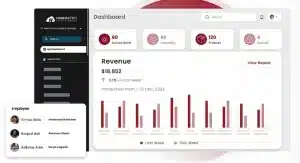Scheduling mistakes, mismatched contract specs, and budget issues are all too common in construction. If you’re dealing with project delays, legal disputes, or cash flow problems, you’re not alone. These challenges can cost you more than money—they can damage your reputation and client trust.
Imagine having all your contract details in one place, with tools to keep your projects on track, on budget, and compliant. That’s where construction contract management systems come in. These systems streamline contract processes, making it easier to handle negotiations, deadlines, and financials.
In this article, we’ll dive into how a construction contract management system can transform the way you manage contracts, tackle common industry problems and why upgrading to modern solutions is the key to your success.
Key Takeaways
|
Table of Contents
What is Construction Contract Management?
Construction contract management is a system that helps construction companies handle their contracts more efficiently. It automates processes like contract creation, tracking, and compliance, ensuring projects stay on schedule and within budget while reducing risks and improving overall performance.
A construction contract management system helps your team handle contracts from start to finish with ease. It keeps all contract details in one place so you can track costs, deadlines, and compliance more effectively, ensuring your projects stay on track and meet client expectations.
Why Do Construction Companies Need Contract Management Systems?

Construction contract management is a system that helps companies manage contracts from start to finish. It integrates with ERP solutions to automate tasks like creating, tracking, and closing contracts. These are why it’s important:
- Better Cost Control: You can track contract details in real-time, helping you stay on budget and avoid unexpected costs.
- Faster Operations: Automation speeds up the work, cutting down on time spent on paperwork and reducing errors.
- Improved Risk Management: With all contract data in one place, you can spot risks early and make smarter decisions.
- Increased Compliance: The system helps you ensure all contracts meet local laws, lowering the risk of legal issues.
Using construction management software lets your company enjoy better control over costs, time, and risks. This solution makes it easier to manage projects and stay on track. Adopting this modern approach can boost your efficiency and help your business succeed in the long run.
Essential Features of a Construction Contract Management System
A good construction contract management ERP makes tracking, managing, and staying on top of contracts easier. Simplifying the process reduces mistakes and ensures everything runs smoothly from start to finish. Some of its features are:
- Centralized Document Storage: Keep all your contract documents in one place, making them easy to access and refer to whenever you need them.
- Automated Alerts: Set up automatic reminders for important dates, deadlines, and milestones so you never miss a critical task.
- Financial Tracking: Link the system to your accounting tools to track payments, invoices, and budgets, helping prevent financial discrepancies.
- Collaboration Tools: Use secure communication channels to quickly address issues and keep everyone on the same page throughout the project.
These essential features help you stay organized and manage contracts more efficiently. By improving how you handle documents, deadlines, finances, and communication, the system makes your job easier. Investing in these tools not only saves time but also reduces risks and improves project success.
Why Switch to a Modern Contract Management System?
Switching to a modern contract management system helps construction companies in the Philippines work more efficiently. These systems grow with your business, handling more contracts and projects as you expand. With real-time data and analytics, you can make smarter decisions, reduce errors, and improve project outcomes.
A modern system ensures all contracts meet local regulations and industry standards, lowering the risk of legal issues. By delivering projects on time, within budget, and with clear communication, you strengthen client relationships and boost your reputation in the industry.

Common Challenges in Construction Contract Management and How to Solve Them
Construction contract management is a system that helps construction companies efficiently handle contracts throughout their lifecycle. By automating key tasks, this system reduces errors and ensures smoother project execution, saving both time and money. Some of the challenges are:
- Scope Creep: This happens when the project’s scope changes without proper documentation or approval. A contract management system keeps all changes tracked and ensures they are authorized, preventing delays and confusion.
- Missed Deadlines: Deadlines can be easily missed without a clear system to monitor them. Automated reminders and tracking help ensure deadlines are met and the project stays on schedule.
- Compliance Risks: Construction projects often involve strict regulations. A contract management system ensures all contracts comply with local laws, reducing the risk of legal disputes.
- Cost Overruns: Managing budgets can be difficult, especially when costs change unexpectedly. The system helps track expenses and ensures costs stay within budget, avoiding surprises.
By addressing these common challenges, a construction contract management system helps ensure that projects run more smoothly. Switching to a digital solution can save you time, money, and stress, while also improving the outcome of your projects.
Contract Management Process in Construction Company
The contract management process in construction follows several key steps to ensure smooth project execution. Each step helps manage agreements effectively while reducing risks and improving efficiency.
- Preparation and Drafting ensures that all project requirements and details are clearly outlined in the contract. This step sets the foundation for a successful agreement.
- Negotiation allows parties to discuss and adjust terms like timelines, costs, and responsibilities until an agreement is reached. Clear communication during this step minimizes potential disputes.
- Approval confirms that all terms are agreed upon and finalized by both parties before signing. This step ensures mutual understanding and commitment.
- Execution begins the active implementation of the contract, where both parties fulfill their obligations as outlined.
- Monitoring and Compliance involves tracking the project’s progress to ensure it stays on schedule and within budget. This step also ensures that all contractual obligations are met.
- Change Management handles any necessary amendments or modifications to the contract due to unforeseen circumstances. Proper documentation keeps all changes transparent and agreed upon.
- Closure marks the completion of the contract, ensuring that all terms have been fulfilled and final deliverables are approved.
By following these steps, construction companies can maintain organized, effective, and compliant contract management throughout their projects. This process minimizes risks, enhances communication, and ensures project success.
How HashMicro’s Contract Management Software Helps

HashMicro’s Contract Management Software helps construction companies handle contracts more effectively by putting all contract data in one easy-to-access platform. It works seamlessly with accounting and project management tools, ensuring every contract is managed smoothly and efficiently.
Some of the features to help in managing contracts are:
- Centralized Contract Data keeps all your important documents in one place, making it easy to find and manage them.
- Automated Reminders notify you about deadlines and milestones, so you never miss an important task.
- Cost Tracking Tools help you monitor expenses in real time and stay within your budget.
- Compliance Management ensures all contracts meet local regulations, reducing legal risks.
- Integration with Key Systems connects your accounting, HR, and project tools for better coordination across your team.
With HashMicro’s software, you can reduce delays, control costs, and keep your projects compliant. This powerful solution helps you deliver successful outcomes while building better relationships with your clients.
Conclusion
Construction contract management is a system that simplifies the way construction companies handle contracts. It automates processes like tracking, creation, and compliance, helping projects stay on schedule and within budget. By reducing risks and improving efficiency, it
Switching to a modern system like HashMicro’s Contract Management Software can transform how you manage contracts, ensuring smoother project outcomes and better client satisfaction. Take the next step to improve your project success—try the free demo today!
Frequently Asked Questions
-
What is the construction management contract method?
It is a project delivery method where a construction manager oversees planning, design, and execution. This method ensures efficient coordination, cost control, and timely project completion.
-
What are the 5 elements of a construction contract?
The five elements include scope of work, project timeline, payment terms, change orders, and dispute resolution. These elements outline responsibilities, expectations, and safeguards for all parties involved.
-
How do you explain contract management?
Contract management is the process of creating, monitoring, and maintaining agreements throughout their lifecycle. It ensures compliance, reduces risks, and improves efficiency by organizing all contract details in one system.





































